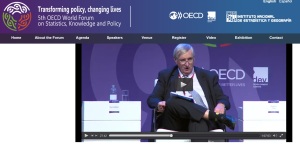Transforming policy changing lives – a view from the 5th OECD World Forum
 The OECD (partners on our cross-cutting evidence programme) held it’s 5th World Forum on Statistics, Knowledge and Policy last week with a focus on action and implementation.
The OECD (partners on our cross-cutting evidence programme) held it’s 5th World Forum on Statistics, Knowledge and Policy last week with a focus on action and implementation.
Bringing together examples of policies, frameworks and institutions that are using new well-being measures around the world it looked to answer the question evolving from “How do we measure progress?” to “How do we best put those measures into practice for policies aimed at improving lives?”.
→videos of all the forum sessions.
Our Chair, Dr Paul Litchfield reflects on the forum below.
 I have just attended the 5TH OECD World Forum on Statistics, Knowledge & Policy held in Guadalajara, Mexico. The event drew some 1,400 representatives from around the world to discuss wellbeing and how measures are being used to drive a new approach to setting and evaluating policy.
I have just attended the 5TH OECD World Forum on Statistics, Knowledge & Policy held in Guadalajara, Mexico. The event drew some 1,400 representatives from around the world to discuss wellbeing and how measures are being used to drive a new approach to setting and evaluating policy.
For me, the event signalled a step change in attitudes. Multiple examples were showcased of how a focus on wellbeing is transforming lives and, critically, a succession of political leaders articulated how they are now placing the concept at the heart of what their administrations are seeking to achieve. Inevitably at an event with a strong focus on statistics, measurement featured strongly but it was refreshing to hear that most people are moving beyond dry debates about definitions and methodologies to focus on action and implementation. The broad range of backgrounds evident among the speakers reflected the potential strength that is available through multidisciplinary collaboration. However, there are many residual silos of expertise that will compromise rapid progress unless we learn each other’s languages, adapt to each other’s ways of thinking and respect evidence gathered in a manner different to our own conventions.
The programme featured a number of inspirational interventions but, as ever, Joseph Stiglitz’s contribution stood out for its coherence, gravitas and challenging messages. The evidence presented to show the rise in inequalities that we have experienced in recent times was sobering. Similarly the observation that the impact on human capital of the economic crisis has been underrepresented was compelling and the lifelong loss of training and skills acquisition resulting from high levels of youth unemployment must be a major cause for concern.
On a more positive note, the demonstration of how “big” and crowd sourced data can be used to supplement traditional collection methods was stimulating. The elegant presentation by Johannes Eichstaedt of the strong predictive power of language used in social media to identify risk factors for disease and the optimum areas for intervention was truly exciting for a physician trained long before Twitter and other applications had been conceived. The point was well made however that such sources are by nature ephemeral and cannot therefore be relied upon for the longitudinal studies that add so much to our knowledge.
The What Works Centre for Wellbeing was well represented with Gus O’Donnell, Richard Layard and Saamah Abdallah all speaking from the platform. I took the opportunity in the panel session to which I contributed to describe the work of the Centre and to set that in the context of the What Works Network and the behavioural insights movement in general. Our work attracted considerable interest and there is undoubtedly potential for future collaboration with a number of bodies from around the world.
